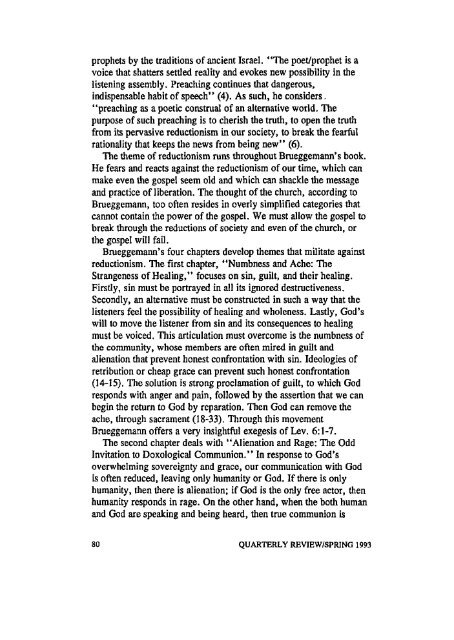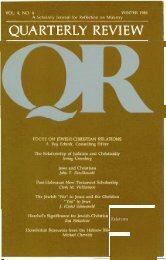TJieodore W. Jennings, Jr. The Meaning of ... - Quarterly Review
TJieodore W. Jennings, Jr. The Meaning of ... - Quarterly Review
TJieodore W. Jennings, Jr. The Meaning of ... - Quarterly Review
Create successful ePaper yourself
Turn your PDF publications into a flip-book with our unique Google optimized e-Paper software.
prophets by the traditions <strong>of</strong> ancient Israel. "<strong>The</strong> poet/prophet is a<br />
voice that shatters settled reality and evokes new possibility in the<br />
listening assembly. Preaching continues that dangerous,<br />
indispensable habit <strong>of</strong> speech" (4). As such, he considers.<br />
"preaching as a poetic construal <strong>of</strong> an alternative world. <strong>The</strong><br />
purpose <strong>of</strong> such preaching is to cherish the truth, to open the truth<br />
from its pervasive reductionism in our society, to break the fearful<br />
rationality that keeps the news from being new" (6).<br />
<strong>The</strong> theme <strong>of</strong> reductionism runs throughout Brueggemann's book.<br />
He fears and reacts against the reductionism <strong>of</strong> our time, which can<br />
make even the gospel seem old and which can shackle the message<br />
and practice <strong>of</strong> liberation. <strong>The</strong> thought <strong>of</strong> the church, according to<br />
Brueggemann, too <strong>of</strong>ten resides in overly simplified categories that<br />
cannot contain the power <strong>of</strong> the gospel. We must allow the gospel to<br />
break through the reductions <strong>of</strong> society and even <strong>of</strong> the church, or<br />
the gospel will fail.<br />
Brueggemann's four chapters develop themes that militate against<br />
reductionism. <strong>The</strong> first chapter, "Numbness and Ache: <strong>The</strong><br />
Strangeness <strong>of</strong> Healing," focuses on sin, guilt, and their healing.<br />
Firstly, sin must be portrayed in all its ignored destructiveness.<br />
Secondly, an alternative must be constructed in such a way that the<br />
listeners feel the possibility <strong>of</strong> healing and wholeness. Lastly, God's<br />
will to move the listener from sin and its consequences to healing<br />
must be voiced. This articulation must overcome is the numbness <strong>of</strong><br />
the community, whose members are <strong>of</strong>ten mired in guilt and<br />
alienation that prevent honest confrontation with sin. Ideologies <strong>of</strong><br />
retribution or cheap grace can prevent such honest confrontation<br />
(14-15). <strong>The</strong> solution is strong proclamation <strong>of</strong> guilt, to which God<br />
responds with anger and pain, followed by the assertion that we can<br />
begin the return to God by reparation. <strong>The</strong>n God can remove the<br />
ache, through sacrament (18-33). Through this movement<br />
Brueggemann <strong>of</strong>fers a very insightful exegesis <strong>of</strong> Lev. 6:1-7.<br />
<strong>The</strong> second chapter deals with "Alienation and Rage: <strong>The</strong> Odd<br />
Invitation to Doxological Communion," In response to God's<br />
overwhelming sovereignty and grace, our communication with God<br />
is <strong>of</strong>ten reduced, leaving only humanity or God. If there is only<br />
humanity, then there is alienation; if God is the only free actor, then<br />
humanity responds in rage. On the other hand, when the both human<br />
and God are speaking and being heard, then true communion is<br />
80 QUARTERLY REVIEW/SPRING 1993












